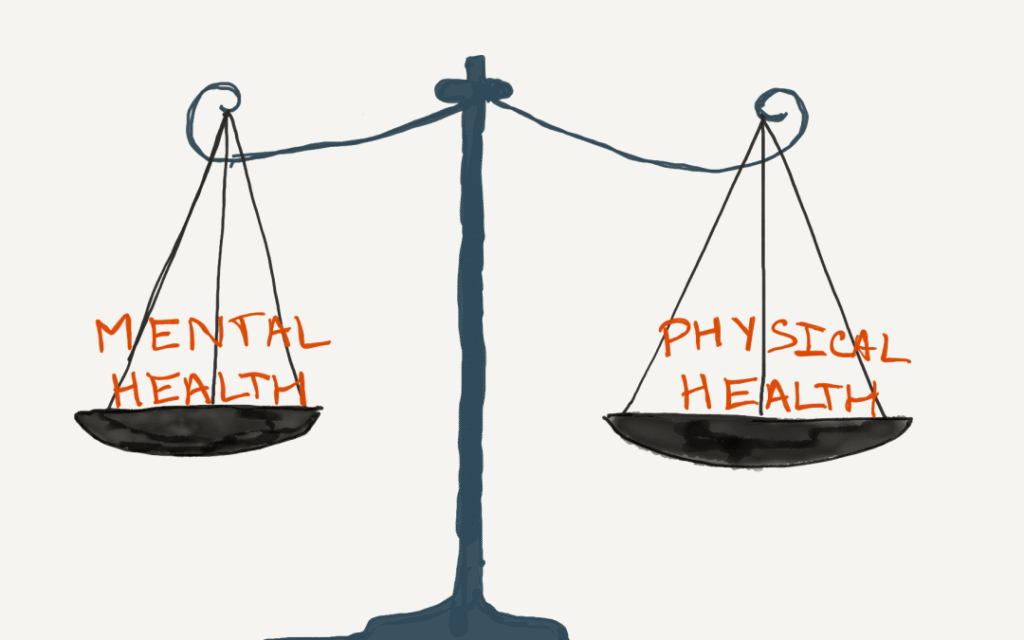For decades, the healthcare world treated mental and physical health as separate arenas. But science—and experience—shows something deeper: the link between mental and physical health is undeniable. Your mind and body are in constant conversation, influencing, shaping, and sometimes straining each other.
Understanding and nurturing this connection can lead to a longer, healthier, and more fulfilling life. Let’s explore why true wellness demands care for both.
How Mental Health Influences Physical Health
Your thoughts and emotions don’t just stay in your head—they impact your entire body. Depression, chronic stress, and anxiety have been linked to increased risks of heart disease, high blood pressure, weakened immune responses, and even digestive disorders.
When your mind suffers, your body listens—and reacts.
How Physical Health Affects Mental Well-Being
The reverse is equally true. Poor physical health, whether from chronic illnesses like diabetes, arthritis, or obesity, can drain emotional strength, increasing feelings of sadness, frustration, and helplessness. Regular pain or fatigue often leads to anxiety and depression.
Taking care of your body strengthens your mind.
The Science Behind the Connection
Hormones like cortisol, adrenaline, serotonin, and dopamine all serve as bridges between your mind and body. Chronic stress, for example, elevates cortisol levels, weakening immune function and promoting inflammation—a major contributor to both physical and mental illnesses.
Your internal chemistry reflects your emotional and physical states.
Common Conditions Where Mental and Physical Health Intersect
-
Depression and Heart Disease: Depression can increase heart attack risk and worsen recovery.
-
Anxiety and Gastrointestinal Disorders: The “gut-brain axis” shows how anxiety triggers IBS and other GI issues.
-
Chronic Illnesses and Mental Health: Living with conditions like cancer or diabetes dramatically affects emotional well-being.
Illness rarely lives in isolation—it touches every part of you.
The Role of Stress in Health Problems
Stress may feel psychological, but it wreaks havoc on physical health:
-
Increases blood pressure
-
Weakens immune defenses
-
Accelerates aging
-
Raises risk of chronic diseases
Managing stress isn’t a luxury—it’s essential to survival.
Inflammation: The Common Culprit
Chronic inflammation is increasingly recognized as the underlying factor linking poor mental health and physical diseases like arthritis, cardiovascular illness, and even Alzheimer’s.
Reducing inflammation through diet, exercise, and stress management benefits your entire being.
Exercise as a Bridge Between Mental and Physical Health
Physical activity is one of the best tools for nurturing the mind-body connection. It:
-
Releases endorphins
-
Reduces cortisol levels
-
Enhances brain function
-
Strengthens heart and muscles
Move your body, heal your mind.
Nutrition’s Impact on Mental and Physical Wellness
Your brain consumes up to 20% of your daily calories—what you eat matters! Diets rich in omega-3 fatty acids, antioxidants, fiber, and probiotics promote better mood, cognitive function, and physical strength.
Healthy food is the foundation of a healthy life.
The Importance of Sleep for Mind-Body Balance
Sleep is critical repair time for both mental and physical systems. Chronic sleep deprivation is linked to depression, anxiety, obesity, heart disease, and impaired immune function.
Prioritize sleep like your life depends on it—because it does.
How Poor Mental Health Can Weaken the Immune System
Depression, chronic stress, and anxiety impair immune response, making you more vulnerable to infections and slower to recover. A stressed mind creates a weakened shield against illness.
Protect your mind to protect your body.
Benefits of Mindfulness and Meditation
Practicing mindfulness reduces symptoms of anxiety, depression, and chronic pain. Meditation promotes relaxation, lowers blood pressure, and improves emotional regulation.
Training the mind transforms the body.
Social Connections and Their Dual Role
Strong social ties are vital for mental health, and they also improve physical outcomes:
-
Lower risk of heart disease
-
Stronger immune responses
-
Increased longevity
Love and friendship are life-saving medicines.
The Dangers of Ignoring Mental or Physical Health
Neglecting either aspect of health can create a vicious cycle: poor physical health worsens mental health, and declining mental health worsens physical health. Preventative care, holistic approaches, and early intervention are key.
Healing one helps heal the other.
Creating a Holistic Wellness Routine
To honor your mind-body connection:
-
Exercise regularly
-
Eat nutrient-dense foods
-
Prioritize quality sleep
-
Manage stress mindfully
-
Seek therapy or counseling if needed
-
Maintain strong social networks
Wellness isn’t a luxury—it’s a daily practice.
Warning Signs to Watch For
-
Persistent fatigue
-
Frequent illness
-
Mood swings
-
Digestive problems
-
Sleep disturbances
These are your body’s way of waving a red flag—don’t ignore them.
The Future of Healthcare: Integrative Medicine
More healthcare providers are embracing integrative approaches, treating mental and physical health together through lifestyle medicine, mind-body therapies, and personalized prevention plans.
The future of health is holistic—and it’s here.


